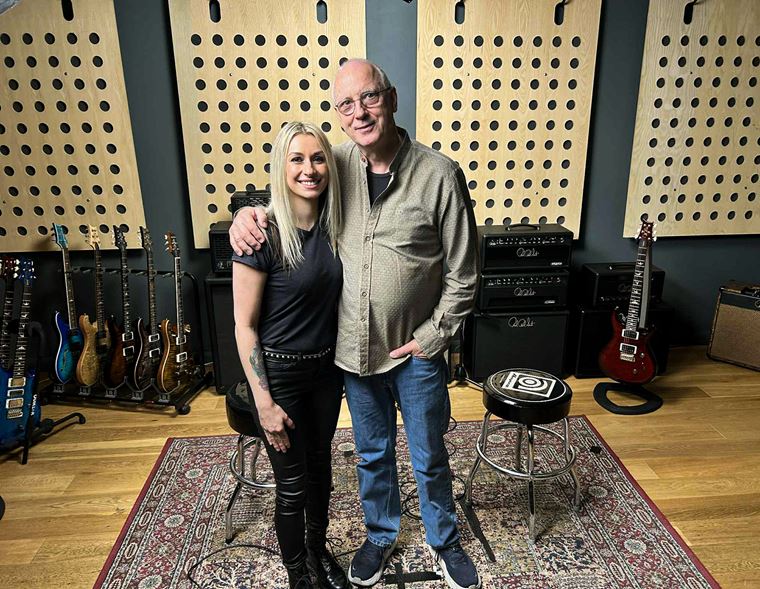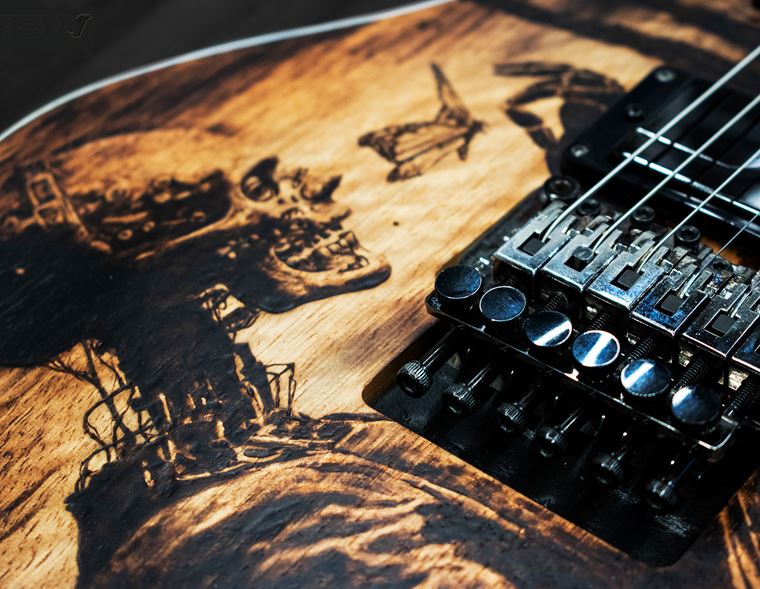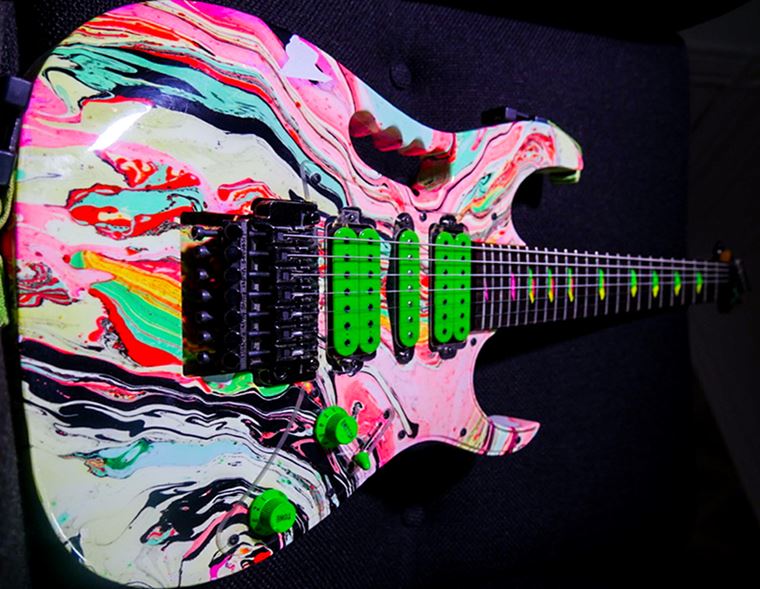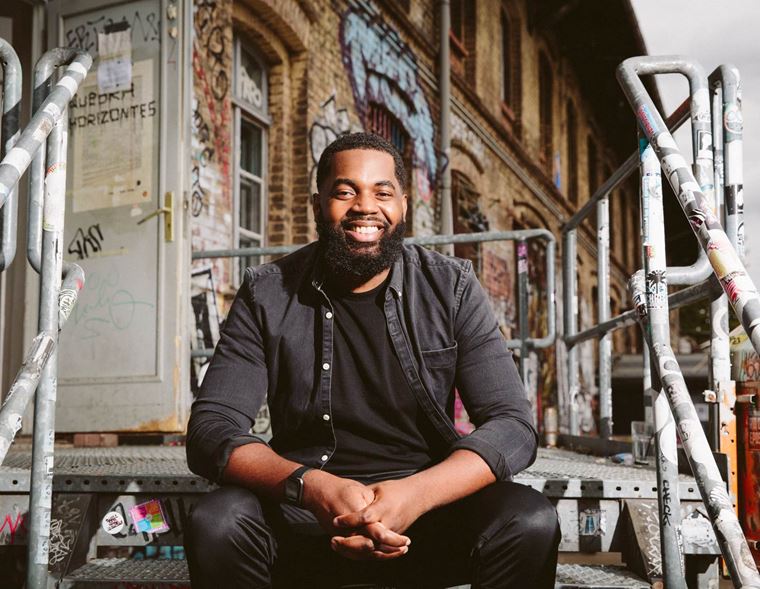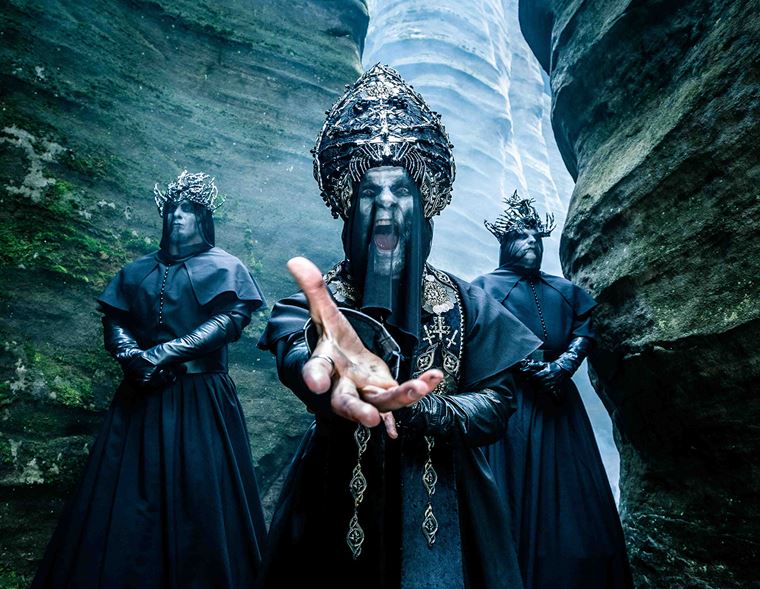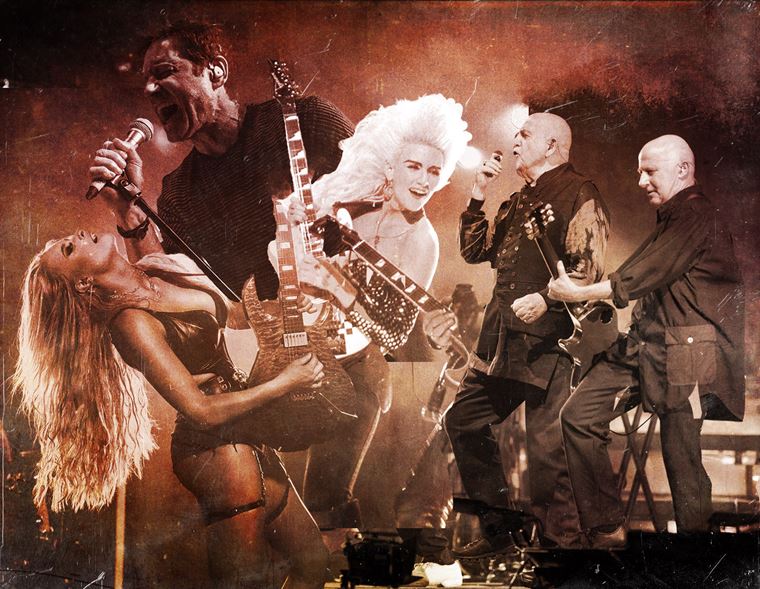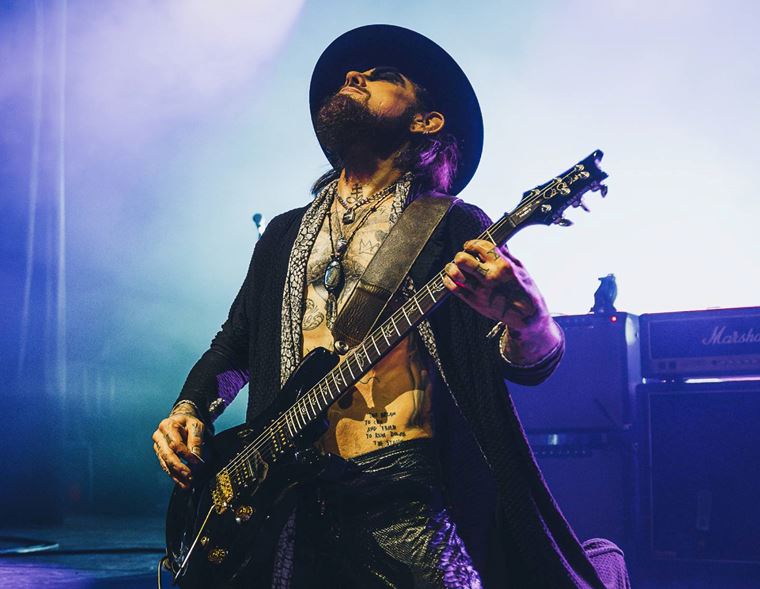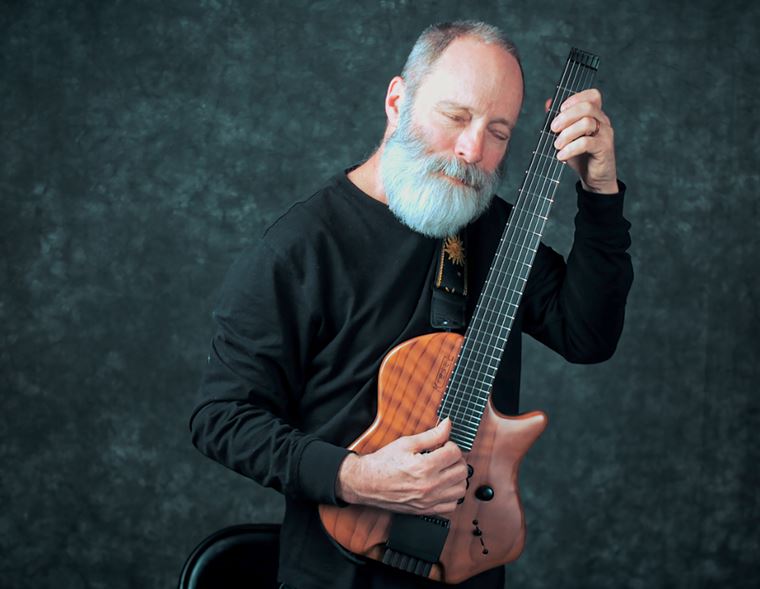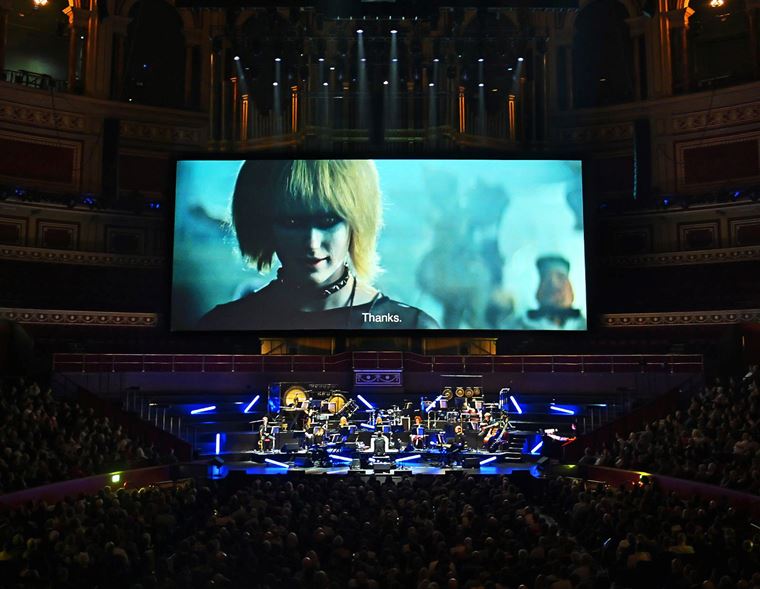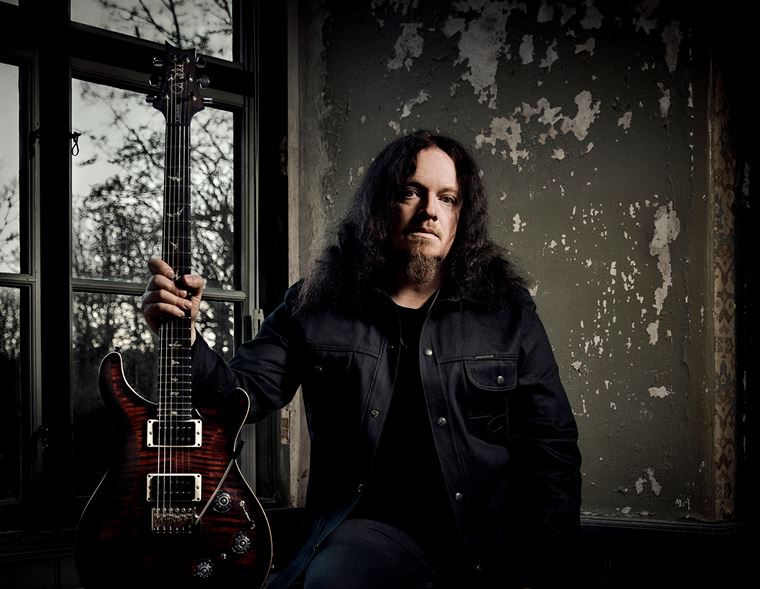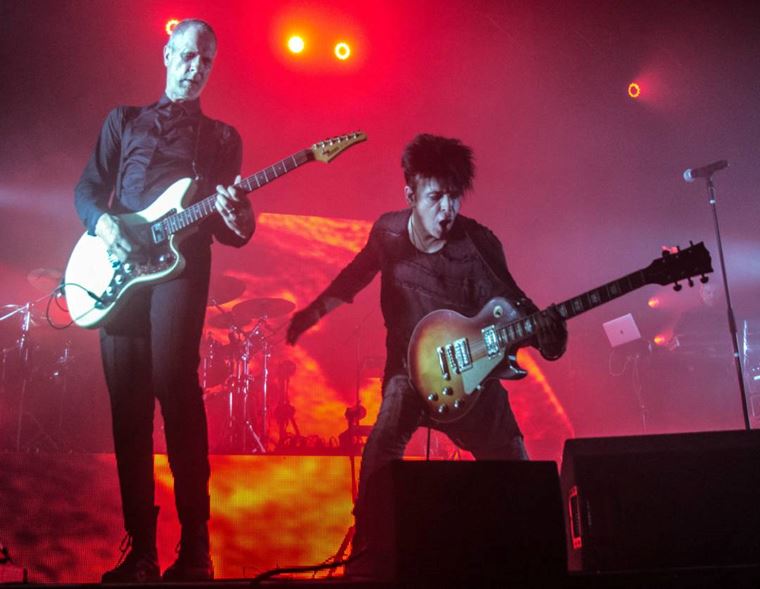"Songs are masks and some of them look more like you than others": DAVID DUCHOVNY Speaks to guitarguitar!
It’s a typically dark Glasgow evening when I head over to my computer at 8.30pm for a Zoom interview. It’s a bit later than office hours, but pretty normal when speaking with people in the USA.
What’s maybe less normal is that the musician I’m just about to chat to is also starring in a new movie with Meg Ryan! He’s also pretty well known to the world for playing two iconoclastic FBI agents (Twin Peaks and the X-FIles), a troubled writer/Hollywood lothario (Californication) and a number of other iconic characters on film and TV.
It’s David Duchovny, of course, and we can also add novelist, director and musician to his multi-hyphenated job description, such is his seemingly endless energy and creativity. My occasion to speak to David is to discuss a European tour that begins in a few short weeks, but we were also able to delve quite deeply into his songwriting process, lyrical approach, musical influences and a whole lot more.
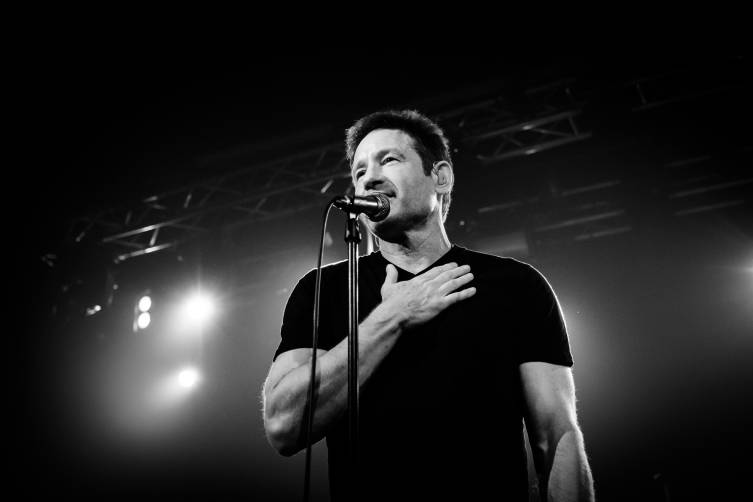
(photo: Chris Frape)
What I found throughout our conversation was not only that David’s as friendly and laid back as you’d hope, but he’s very much a committed and serious songwriter. His sense of humour is also strong: upon joining the call, I found David strumming a fetching Guild Starfire, which he explained by saying “I’m very superficial: I buy guitars that are pretty!” I knew right then that he was gonna be my kind of guy!
Ongoing writer’s strike action meant that I couldn’t discuss too many topics outside of music, but then music was what we were there for, so read on to learn all about David’s love for Lou Reed, Martin acoustics and afternoon naps!
Contents
David Duchovny Interview
guitarguitar: I guess the thing that always interests me about writers is how they begin the process of writing a song, so how does it start with yourself?
David Duchovny: It’s not uniform, but I would think, generally, it starts with just a chord progression that I’m liking, and then hearing some kind of a melody on top of that. And then trying to put a basic word/thought/feeling to that initial melody. So it usually starts with a chord progression that’s interesting my ear, and it interests my ear because I can hear something on it. That’s usually what happens.
You know there are only so many chord progressions that sound good, right? I work in those! Just now I was strumming a D minor to a C major 7th to a C and that was sounding good! Maybe I’ll start to hear something over this?
GG: Okay, so that’s interesting. My preconception was based on some research I did on you, when I found out that you have an MA in English Literature from Yale and so on. I thought that lyrics must be the biggest deal for you - and I’m sure they will be a big deal - but does that mean you’re going to come to the lyrics from the point of view of already having a melody?
DD: Well yeah, in the sense that the melody is kind of a feeling. So, the vibe that I’m feeling in the melody is going to lead me in a certain direction for words. I do have random words written down, like on files in my iPad; phrases that I like, usually phrases that are really ambiguous. Those, to me, are the best ones, because they can just unfold different meanings as time goes on.
So, I do have lyrics stocked away, but I feel like I’ve gone through those. I feel like, you know, whatever I’m writing now is gonna be a new lyric.
GG: Mm-hmm, yeah! That actually kind of answered one of my other questions, about gathering ideas. So, it tends to be that things will germinate from you sitting with your guitar, and something will catch your ear, then it’s the journey that comes after that?
DD: Yeah, and then I’ve found that it’s almost like I have to honour that initial impulse. Like, maybe after we get off this, I’ll go back and start strumming, see if there’s an actual song there. Because sometimes, I’ll put the guitar away and write down whatever chord progression I like and come back in a month or a week or a year and be like, ‘I don’t hear it’. I feel like songwriting’s really of the moment, so you have to sit down and write the song you’re gonna write today, you know?
GG: I do.
DD: That would be different from a song where I sat down maybe with the same chords and wrote tomorrow, but I won’t write a song unless I write a song today, you know? (laughs)
GG: Exactly! Would you subscribe to the idea that sometimes, songs are just kind of floating by, and if you happen to be at the guitar at the right moment, you can catch them? Later on you wouldn’t be sitting there for it, so that’s why tomorrow’s song would be different?
DD: Yeah, absolutely! That’s not to say that you’re not writing them - you’re not transcribing them, either - but for instance, not to harp on about what I’m doing today, but I was just thinking about I never really liked that D minor shape to play: it’s very kind of tight. So I’m like, ‘I hope I can get better at D minor’. So I was strumming that and thinking, ‘what comes after this? I know F sounds good’, so that’s kinda the way it happens for me.
Also, I’m reading this biography of Lou Reed, so I’m looking at his chords, in a way. To me, somebody that writes like Lou Reed, to me is inspiring, because he doesn’t have this voice that’s going to cover up a lot of cracks. The words have to carry some ‘thing’. Obviously he wrote melodies and stuff, but they’re not like these American Idol-type blow-your-mind type of things (laughs) and I don’t have that either. I think he’s a master of spoken song style, which I gravitate towards, too.
GG: Yeah, there’s a lot of space to be subtle there, where it isn’t - and I don’t know if you’d agree - but it’s not necessarily like he’s declining to sing a melody (David laughs), it’s that there’s space around the notes, right?
DD: Haha, yeah, he’s outlining where he might go. I was actually just watching a video because I was reading this book, and he does a version of Candy Says with Anohni from Anohni and the Johnsons. She has this otherworldly instrument for a voice and the two of them together couldn’t be more of a stark contrast, and you’re moved by both of their performances.
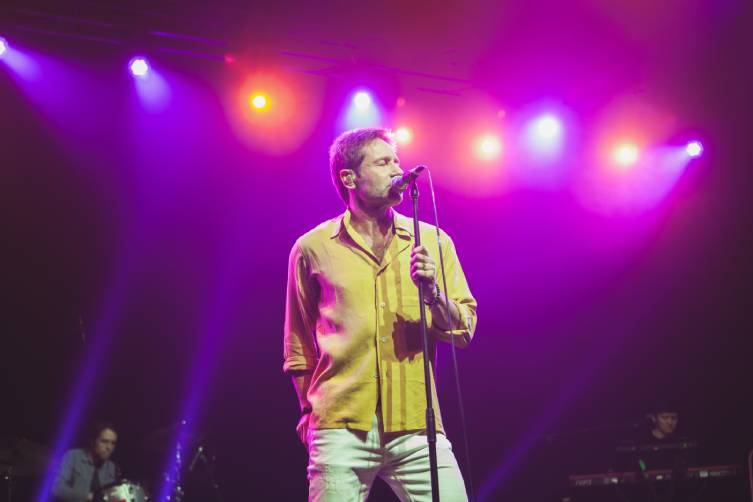
(photo: Jane Jimenez)
GG: Yeah, it’s like sweet and sour right there in the one song!
DD: Haha, yeah! There is something about that voice that’s just really evocative.
GG: Absolutely! Now, lyric writing and your literature background: I don’t know if that’s a relevant thing to ask or whether that’s just me being a bit obvious after Googling you for a bit, but do you think that has played a part in your relationship with lyrics?
DD: I think it’s a good question. I think my answer would be varied in a way because, even if I don’t have a huge spoken vocabulary, I probably have a big literature vocabulary in my mind. I guess that’s not necessarily an advantage because I’ve found that lyric writing has to be deceptively simple. When I first thought about writing lyrics, I had written poems - for my whole life I’ve written poems - and I thought, really, it’s just putting poems to music, but it’s not! With poems, words have to do everything, and in songs, if the words are doing everything, it’s gonna fight the music, you know? It’s tough. It’s really been a self-education for me in lyric writing, because I had assumed it was gonna be like writing poetry. It may be a subset; it may be a cousin; it may be closer to writing poetry than it is to writing fiction - maybe not - I’m not even sure. I don’t know.
"In a way, I think songs are masks anyway. They're masks and some of them look more like you than others"
GG: That’s true about them being cousins, because you still have the sonic properties of the words and the correlations of the words. And you also have limited space to see what you mean, or at least evoke something, right? So there’s always that pressure of…do you do a Springsteen, where there’s loads and loads of lyrics, or is it Lou Reed, where there’s very little, you know?
DD: Yeah, well I’m thinking also, in my poems, I don’t rhyme: that’s hokey, you know what I mean? But in music, I love rhyming, I love to hear it in the lyric and I also love the fact that the rhyme will force me into a word that I might not rationally or logically choose. So words themselves, if you force them to a rhyming kind of a scheme, will short-circuit your logic in a way that I really like: thoughts you wouldn’t necessarily have if you were not searching to rhyme something.
GG: That’s an interesting point! I like that ‘short circuit’ notion, because earlier, when you mentioned about the correlation between lyric-writing and poetry, I thought: the interior vocabulary you developed through your education might even have created different neural pathways in your brain to associate different words, like a benefit of all of that extra vocabulary you learned? It might suggest other things, stuff that might not come to another writer?
DD: Maybe! But when I start writing lyrics, I always think I should get one of those rhyming dictionaries. I got one but I couldn’t figure out how to use it! I didn’t understand the phonetic spelling, and I was like, ahh, this sucks! But I do need to get back to it, because I feel like I’m exhausting certain lines in my lyrics. I should branch out! Sometimes I think you can get too fancy, though. There’s kinda that fight when you’re writing lyrics, that you don’t wanna out-smart yourself, but it’s kinda like the performance of the song is that it’s only gonna work this way, and that’s just how that song goes.
GG: If that’s the way the song’s coming, that’s the way the song’s coming!
DD: Yeah, right!
GG: Now, I don’t know how basic this idea might be, but because you’re obviously well known as an actor: when you write lyrics, do you create characters? And is that similar to how you would create a character for a role in terms of the sort of inner-game of that?
DD: I would say that - again, thinking of Lou Reed here, who has a bunch of songs like Candy Says, Lisa Says… - there’s a lot of characters in his writing. I haven’t yet quite done that, where I’ve adopted an actual voice of somebody, but I do feel that every song is a different character. Not named, not necessarily so individuated, but whatever vibe or melody I’m working off of will put me in a mood and just access a certain kind of a point of view.
GG: Mm-hmm, I get you.
DD: If you’re writing about heartbreak or something, it’s not necessarily that you’re feeling heartbroken at the moment, but you can access that and speak that through a character or a set of words. But it’s not conscious of like ‘Mmmm, I’m thinking of a character, and let’s write a song in that character’. It evolves organically from the melody I’m hearing or the words that I’m starting with. That becomes…I don’t know if it’s a character or a point of view, but it doesn’t necessarily feel like it’s me, even though I have access to that point of view. I’m not really that interested in writing a song that would be like ‘David Says’, you know? (laughs)
I feel that songs are wonderfully open to interpretation, and if you get too involved in owning the point of view - this is my protest song, or this is my anti-Trump song or whatever - then it kinda shrinks the song a little bit for me. It’s also trying to make it interesting rather than letting it actually find what’s interesting about it.
"I feel that songs are wonderfully open to interpretation, and if you get too involved in owning the point of view, then it kinda shrinks the song a little bit"
GG: It removes a bit of the mystery, doesn’t it?
DD: They mystery and also the back and forth between the listener and the singer. Sure, it can be frustrating if somebody really misinterprets your song, but that’s on you in a way, and that’s great because that’s really, to me, the glory of lyric writing. How badly can it be misinterpreted? That’s good! That’s really good, otherwise you’re writing a telegram or you’re making a political statement of some kind. There’s space for those songs, but to me, they’re not the ones that last quite so long.
GG: Yeah, they have a shelf life. Not to overly push the Lou Reed thing, but it’s interesting that you happen to be reading that biography, because see the likes of the Berlin record: I don’t know about you, but I always feel - and this does relate to what we were talking about a second ago - but I always feel like even though he’s describing these other social situations with characters, it still always sounds like he’s talking about himself still. Do you ever get that from him?
DD: Yeah, well that’s cos he’s so good! That’s okay! He has an album called The Blue Mask, and I’m sure these are masks. In a way, I think songs are masks anyway. They’re masks and some of them look more like you than others. They feel more like you than others. But the fun of it is, you kinda have to give up ego when you write, I feel. You’re just trying to pursue this melody, and trying to pursue a thought, lyrically and it’s not about ‘me’, really. And that goes back to what you were saying: ‘do I believe that songs are in the air?’ Yeah, kind of I do! And it’s not so much about ‘you’. The ‘about you’ part is sitting down, working hard, being available. It’s hard work to be available! (laughs)
Influences
GG: Yeah, absolutely! The thing about masks is very interesting as well. So yeah, I wondered about influences. We’ve spoken a bit about Lou Reed, and I’d like to learn more about your other musical influences, or any other influences that might involve your writing. Certainly, from listening to your music, I was hearing a Neil Young influence, and your song ‘Chapter & Verse’ gave me an R.E.M. vibe. Is that close?
DD: Yeah, those are guys that I love. Neil Young definitely. When we were recording Nights are Harder These Days, I said let’s have it with a real crunchy Neil Young riff right off the top. I didn’t write that riff, I just said, ‘It should sound like that’. So maybe that’s an homage in a way.
R.E.M. is a band that I’ve loved for many, many years, and I think you’re responding to the kind of chirpy rhythmic picking?
GG: I think so.
DD: I like that very much, and again, that’s not how I write the songs, because I can’t play like that! I write strumming chords. Maybe I pick a little bit, but not consistently enough to record like that! But my ear wants it, and I know how to ask for it and talk to Pat McClusker, my guitarist, or play him something I’m hearing but can’t necessarily play myself.
I think Tom Petty too, lyrically he’s got a really fine, vague lyricist. If you can write personally enough yet vaguely enough, the songs grab you because they’re observed without cliche; they’re absorbed fresh and yet they’re not like ‘Tom Says’, you know? He’s able to walk that fine line between the cliche of rock and roll, which belongs to everybody and it’s ‘She loves you, yeah yeah yeah or She left You no no no’ (laughs), and then the finer observations that enrich it.
GG: It’s about being specific but also being universal, so that everybody can get their ‘specific’ from your work.
DD: Yeah! If you’re too specific, just like if there’s too many words in a poem: I want the song to mean something to me, but if you leave enough room, then you can get in there. I think Petty is brilliant at that. Great pop-rock songwriters are gonna be great at that.
And somebody like Dylan, he’s probably the best lyricist of them all, but less kind of universal: more like ‘that’s definitely Dylan’, you know? Also very surreal, and Petty loved Dylan, I think, and kinda put some surreal stuff in there. I think Dylan is the king of just really weird association, stuff that you never would’ve thought. That’s exciting, and continues to be exciting! You hear songs like Blind Willie McTell or whatever and you’re just like ‘Ah!’ Each stanza’s like a different person! And yet they all somehow converge.
Guitars & Touring
GG: Into greatness! Now, you mentioned at the start of our conversation about your Martin acoustic, so let me make a segue and have some geek chat about your guitars!
DD: I’m gonna be disappointing! I’m not really a guitar geek and as I said, I’m superficial and buy pretty guitars. Yeah, it’s a Martin dreadnought, a 10 or a 28, I can’t remember what that number should be. What I will tell you is that it was the first guitar I bought when I was teaching myself and the reason I bought such a nice guitar - because I would advise somebody to buy a cheap guitar! - but I bought this one because I knew that if I spent a lot of money on it, I’d feel guilty if I didn’t actually try to learn it! It’s a beautiful thing there and really wants to be played. I kinda had to psych myself into buying an expensive guitar so that I would feel guilty if I didn’t play it!
GG: You won’t be surprised about how many people do that, to be honest! (laughs) You also won’t be surprised at how many of us are superficial when it comes to buying guitars based on their looks! We’re all the same!
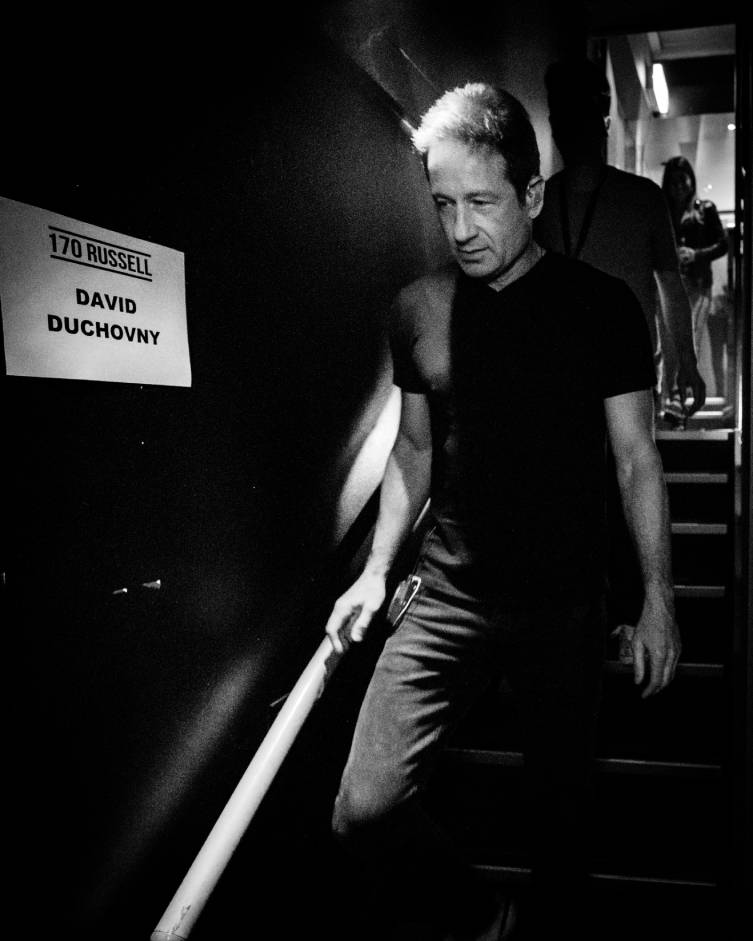
(photo: Chris Frape)
DD: I’m kind of in love from afar with the Hummingbird. One day I’ll buy myself a Hummingbird.
GG: I think you should; I think you deserve one. (laughs) Well, you’re going to be touring very soon. When you tour, do you tend to keep the same musicians, or do you change it up from tour to tour?
DD: The same guys. Same guys I record with, too. We knew each other really well and yeah, it’s comfortable. We’ve never played the songs from the last album live because it came out during the pandemic. We played one festival last year, and we played a set before the Tribeca film festival but we really haven’t gone out there and played Chapter & Verse or Nights are Harder, so we’re looking forward to that.
GG: Brilliant. And for you, because you use the same guys, is the hang as important as anything else?
DD: Yeah, I mean they’re younger than me so they have their own thing. I’m usually taking a nap in the afternoon before a performance while they’re probably sampling the local brew (laughs). I love them for it, but it’s a lot of energy; a lot of expenditure to go out there and play two hours a night. I like the feeling of being ready to do it, not like ‘Ah, I feel shitty’ or half-drunk or hungover, anything like that. True rock ‘n’ roll fashion, you know?
GG: It’s all for show, hahaha! What’s your favourite part of it: writing songs, recording shows or going on tour?
DD: It’s probably the mid-point where I’m demoing songs. Again, I’m not being falsely modest, I’m not a great player so I can hear the song and I’ve got the chords, I’ve got the melody and I’ve got the chorus. Then it’s just like giving it to the guys - who are really good musicians - and saying let’s work on this.
The next step is we have a demo and to me that is almost the song. We go to record it and usually they get a little thicker, more instruments, a little slicker and that’s great too, but there’s something raw about: here’s the initial, barebones song. It’s played well: it’s sung okay, but I haven’t gotten precious with every fucking note, you know? Sing it a few times and use the best of what you’ve got. In the studio, you can go another ten, twenty times, whatever. To me, it’s like ‘Ah! That exists!’ Already I can tell, ‘this is a thing. It’s a song, I was right to pursue that song!’
GG: And the magic is still fresh: you haven’t thrown all the tar at it yet.
DD: Yeah. I do like recording because songs become these complicated things with horns and strings, shit that I don’t know anything about! Harmonies, background vocals, all that stuff. And that’s beautiful: people wanna hear that; they’re used to hearing music like that, but if a song can work in that stripped down demo phase, then you know you’ve got a song.
GG: Just out of interest, when you’re in that demo phase, do you have a laptop in the house to record rough bits and pieces? Or do you go to the studio for the demos?
DD: Well we got together here in September because I want to record an album in February and I had a bunch of newish songs that were just on my phone, my strumming and singing. This is the gym/pool house beside my house and so we just rented some rudimentary stuff to record the guitars and my house right into the machine. No drums, but we had a bass, guitar, and electric keyboard.
When I dropped my son off at college a couple of years ago, I went to this great old music store, like, not fancy. I just wandered in and got this pretty guitar, hard to play - not a great guitar - and I also bought a tiny little xylophone, like a kid’s xylophone with bright blue plastic. We were demoing a song Everybody Gets Lost and I said, ‘I'm hearing xylophone on this’, because I’ve always loved that high tone that can ride over everything. U2 has an early song called I Will Follow, and it has a xylophone on top of it and it just gives me chills when I hear a heavy rock song but on top of it there's this tiny little kid’s xylophone! I’m always looking for ways to sneak a xylophone in! (laughs) I asked Colin, the keyboardist, to play the chord changes on the xylophone. It sounded sweet to me!
GG: Time for the xylophone! You finally got it in a tune!
DD: Haha, it’s only in the demo though! Who knows if it’s gonna last?
GG: Cool, haha! So, just to round things up, you mentioned that you’re maybe going to be recording next year, and you’re touring. Is it the UK and Europe this time?
DD: Yeah, Glasgow, London, Paris, Milan, Vienna and Cologne, maybe? I’m not sure. So it’s a bit of an abbreviated European tour.
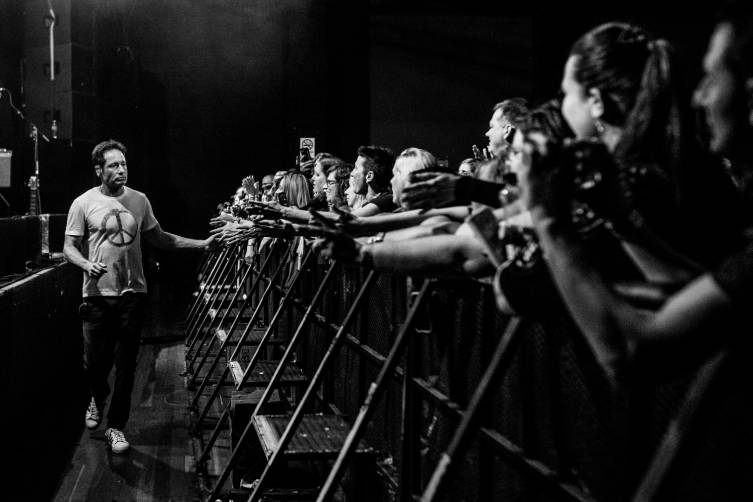
(photo: Chris Frape)
What Happens Later
GG: You’re still getting around! Also, just finally, you’ve got a new movie out with Meg Ryan! You’re a busy man! What’s the story with What Happens Later?
DD: Yeah, it’s really a two-hander: it’s me and Meg the whole way through. We’re two ex-lovers from college who run into each other at a small regional airport here in the States drawing a snow in. So, we’re trapped alone in this airport where we kind of relitigate our relationship and it’s really a kind of…I don’t wanna say ‘mature’ but we’re older! It’s not like a 25 year old romcom, it’s like the lost love looking back, what did we do wrong, do we still respect one another, love one another? Looking back, looking ahead at the end…I don’t know how to explain it, I should start figuring it out, because I’ve got to talk about it!
GG: Haha! I watched the trailer just before we spoke and it does seem to be very much just the two of you. Not being an actor myself, is that an amazingly exciting thing, or is that actually quite terrifying to have so much resting on two people’s shoulders?
DD: I guess it’s both. I was able to rehearse with Meg for quite a bit because she was thinking about doing this movie for at least 9 months before we shot it. We would get together over Zoom and just run through the script, talk about it. Meg was rewriting all the time, so I got to rehearse that movie more than I’ve ever rehearsed anything. That gave me a sense of confidence. And I’d just finished directing a movie three days before I was gonna go do it, so I couldn’t really think about it. I hadn’t thought about it! It’s really only when I saw it…I knew that it was just us two, there’s literally not another line in the movie, but when I saw it, I was like, ‘Holy shit! That is a lot to carry.’ But I didn’t think of it at the time.
GG: That’s probably for the best! I can’t wait to see it. I didn’t realise you were making your own movie as well, that’s probably something I should have brought up there, I apologise about that, David.
DD: That’s alright! It’s a low budget film and I could spend very little money on music. It’s set in 1978, so I ended up putting in one of my own songs (laughs) in the credits because the price was right!
What an enjoyable conversation! I’m looking forward to the tour for sure, and David: let yourself have a Gibson Hummingbird! Haha!
David Duchovny and his band will be touring from November 6th. Head over to the official David Duchovny website for tour dates, tickets and more.
My thanks go out to David for giving up his morning and for such an enjoyable conversation. Thanks also to Debi for putting us in touch.
For over 150 exclusive interviews, head to the guitarguitar Interviews page! More soon!


